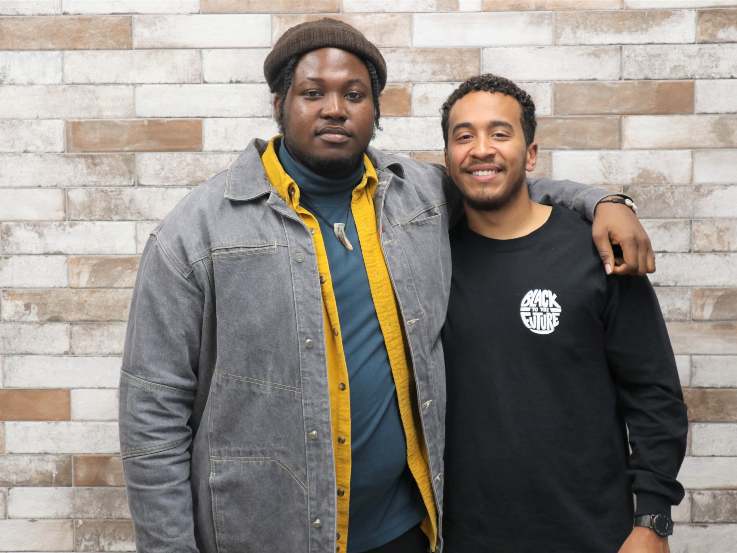Exploring the future of farming through systems mapping

Meet (from left) Hansel Igbavboa and Sheldomar Elliott, food security advocates, the 2019 winners of Toronto Metropolitan’s local Map the System (MTS) challenge, and finalists in the Canadian competition. Passionate about social innovation and equity, their team, Future Farmers, addressed the discrepancy between the declining number of Canadian farmers in light of the increase of immigrants from African and Caribbean countries.
Hansel and Sheldomar stopped by to chat with us about how they are continuing their project on food sovereignty after participating in MTS.
Interview with Hansel Igbavboa and Sheldomar Elliott
How do you define social innovation (SI)?
H: SI, to me, is mostly the shifting of the current socioeconomic status.
S: I think SI is creative, not in a singular way, but in the way that it can spark collaboration amongst different actors and people to ensure that there is progress being made across sectors, whether it is health, technology, education, etc.
What sparked your interest in SI?
S: I’ve always been cognisant of social injustices, but I don’t think I really took action until I was in university. Learning about certain topics in class started to fuel me, and I realized that I can’t expect change to happen if I’m not making change myself.
H: I think for me, SI has always been a big part of who I am. I grew up in a household where my parents had always taught us to prioritize other people, not in a destructive way, but in a way that keeps you aware that there are always people around you that could use some form of extended care.
What is the problem you are hoping to solve through work in SI?
S: With our MTS project, we were focused on the lives of black Canadians, and that is still the primary focus in the work that we continue to do. As black identifying folks ourselves, the work we want to do is to better our communities and ourselves.
H: I want to tell the stories of black folks, by black folks. The world has a very skewed version of our history and our knowledge. I want to uncover the knowledge and history that comes out of and was birthed in Africa. In food, I want to tell the stories of the community members who are ensuring access to more clean food, and acknowledge how those same people have drawn knowledge from African traditions.
Can you tell us a bit more about what sparked your interest in MTS and what drove you to make a submission?
H: What sparked my interest in MTS was the way in which it was different from other competitions I had been a part of. Mainly, in how it was set up. The competition took place across a series of months, rather than being presented as a one-week or two-day hackathon.
S: I had never done a competition before and had never really taken part in anything like this, but I was excited. I saw MTS as a cool challenge for me. I’m grateful that Hansel decided to involve me in the project, and that we are here talking about it today.
My biggest takeaway from the competition was knowing that I am capable of pushing myself. I think what was beautiful about Map the System was that there weren't any external pressures that made me do this. What was pushing me through the competition was that I wanted to do it. Knowing that I wanted to explore food sovereignty and get a head start in it.
What did you learn from taking part in the 2019 MTS competition?
H: My biggest takeaway from the competition was knowing that I am capable of pushing myself. I think what was beautiful about MTS was that there weren't any external pressures that made me do this. What was pushing me through the competition was that I wanted to do it. Knowing that I wanted to explore food sovereignty and get a head start in it.
S: At the end of the day, it was all about believing in ourselves, and knowing that no matter the outcomes of the competition, we would continue to do more research and reach out to more folks. Sure, we were initially doing it for the competition, but we knew there was going to be more coming out of it. I think for us, MTS served its purpose.
What advice would you give to a student at Toronto Metropolitan looking to take on their own SI project?
S: Just go for it. We wouldn’t know any of the people we do now if it wasn’t for taking part in MTS. If you believe in what you are researching, just stick with it and more will come out of it.
H: I think the biggest thing is just making sure that your project is coming from a place of truth for you, rather than just picking up topics that don’t necessarily connect with you. Make sure you are also connecting with the people who are already doing the work, like student groups and organizations.
What’s next for you and your work? Are you continuing on with your MTS project?
S: We are still doing work with some of the folks we had connected with when starting research on our MTS project, in particular with Anan Lololi of Afri-Can Food Basket (external link) , putting together an initiative around black food sovereignty in Toronto.
H: There are lots of amazing folks we are still working with at Toronto Metropolitan and through the Office of Social Innovation.